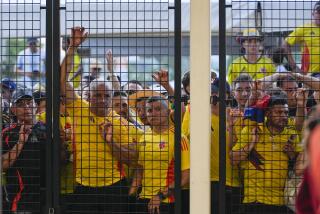WORLD CUP USA ’94 : This Cup Brimming With Tears : Soccer: Tragedy plays a role in a tournament that has otherwise been enormously successful.
- Share via
DALLAS — A player shot dead. A superstar caught for drugs. Violent death in the midst of victory dances. Fans flying to a game killed in a plane crash.
The World Cup is brimming with tears.
In its first U.S. appearance, soccer’s world championship has been a spectacular success, with exciting matches, filled stadiums and a pulsating energy that has stayed under control at the nine sites.
But the world’s most popular sport has a dark side, too, dramatically exposed by 12 gunshots in a parking lot in the cocaine capital of Medellin, Colombia, early Saturday.
The killing of Andres Escobar, who scored an own-goal in the 2-1 loss to the United States that eliminated Colombia from the tournament, was a reminder of the passion and attention soccer generates.
“The popularity of our game has two faces,” said Sepp Blatter, general secretary of soccer’s governing body, FIFA. “The first face produces joy and enthusiasm and brings people together, as we have witnessed at the World Cup here. And on the other face, the game mirrors our life. It has violence, tears, corruption. Like life, it has all its problems.”
Blatter, who has been involved with the sport for decades, called Saturday “the saddest day I have ever witnessed in football, in the World Cup or any other competition.”
It was the second time in three days that soccer and its fanatically followed championship suffered a shock off the field.
On Thursday, Diego Maradona, the captivating but troubled star of Argentina, tested positive for using five banned stimulants and was kicked out of the World Cup. Maradona was suspended for 15 months in 1991-92 for cocaine use.
“It’s like somebody does not like the success of the World Cup,” Blatter said. “I don’t know who to blame. But the two cases we have had in 48 hours -- it’s hard to digest for us.”
The tournament itself has been blissful. Capacity crowds have enthusiastically but peacefully cheered games that have seen more scoring, the emergence of new stars and a surprisingly strong showing for the home team, with a second-round berth for the United States for the first time since 1930.
FIFA has cracked down on on-field thuggery, handing out stiff suspensions for players who go at each other too violently. That has sidelined some key players, such as America’s John Harkes, at important times, but it also has opened up the game.
There has been none of the hooliganism that sometimes springs up around European club matches and had American organizers on the alert.
But death has haunted this World Cup.
Two weeks ago, 12 fans flying to Washington for Mexico’s opener against Norway were killed when their private plane crashed. Highway crashes have killed at least two other soccer travelers.
The Colombian team received a death threat against midfielder Gabriel Gomez before its game with the United States.
Last week, riots broke out in Mexico City as fans celebrated their team’s advancement to the second round. Three people were killed, including one who, witnesses said, was beaten unconscious and then blown apart by a firecracker placed next to his head.
Those deaths, as tragic as they were, were different than the killing of Escobar, a quiet man and smooth player who, for the second time in a week, found himself in the wrong place at the wrong time.
“If something happens by accident, you can say it was the will of God,” Blatter said. “But when people deliberately shoot and kill somebody because he made a mistake in the game, something is wrong.
“We can promote the sprit of fair play. We promote comfort in the stadiums. We control the game and approve sanctions against corruption and cheating, like the Maradona case. But we are helpless, sad -- what can you say in such a situation?”
Perhaps more than any other sport, soccer has had to deal with tragedy. Blatter said it would handle this one, too.
“Football is strong enough to go on,” he said. “The globe is the ball, and it keeps turning.”
More to Read
Go beyond the scoreboard
Get the latest on L.A.'s teams in the daily Sports Report newsletter.
You may occasionally receive promotional content from the Los Angeles Times.






